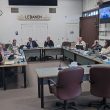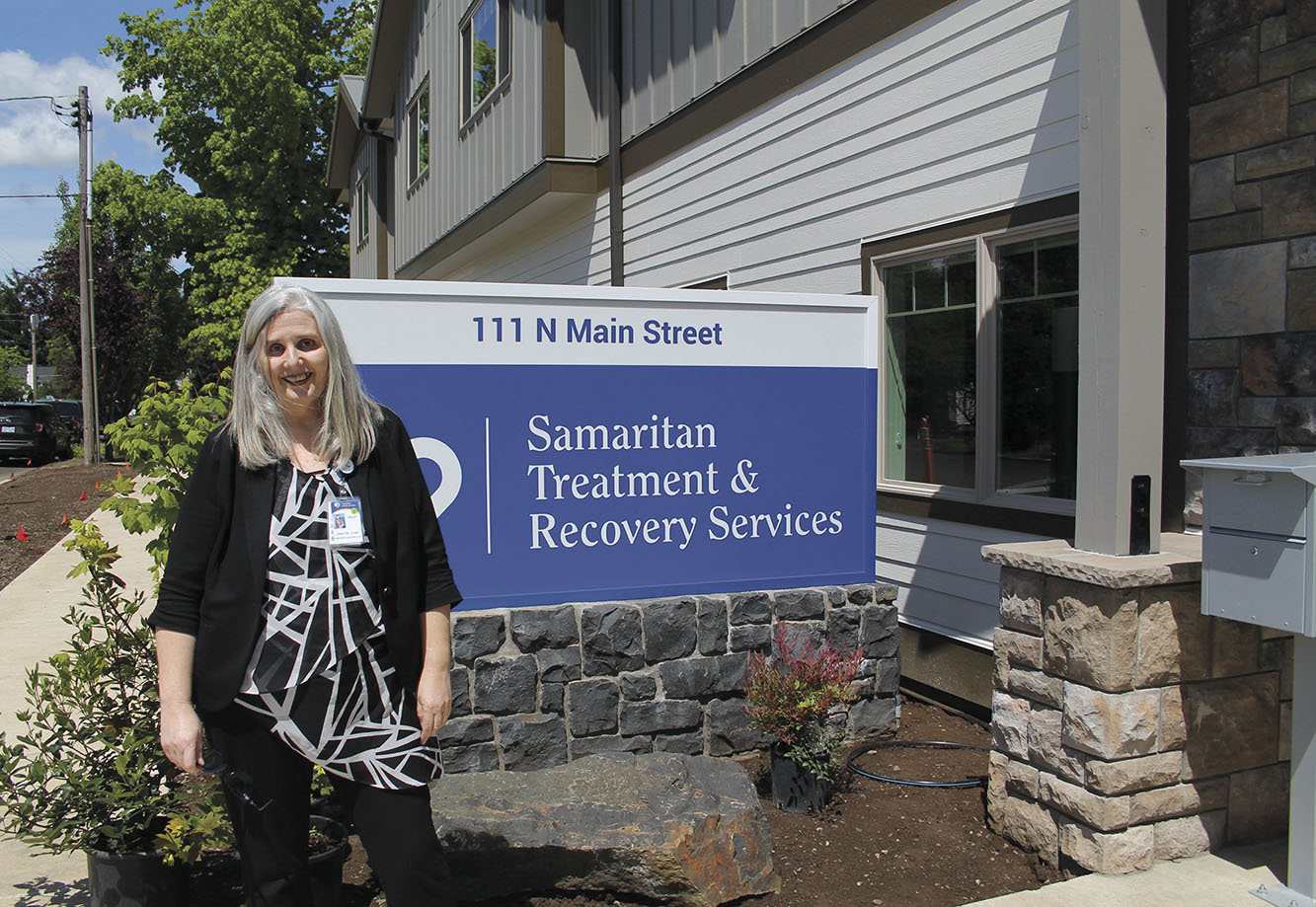By Sarah Brown
Lebanon Local
When she puts her hand on the doorknob that will open to a room full of addicts, Kelley Story thinks about her intention.
“I think about the fact that the minute I walk into that group, I’m no longer Mom. I’m no longer Director. I am the group therapist in that room tonight. I’m there for them. That’s who I am. I’m right here in this room right now with you.”
Kelley Story has an intimately personal understanding about addiction. Now 30 years sober and the director of substance abuse treatment services at the new Samaritan Treatment and Recovery Services, she’s helping other people get clean.
“I come from a family of what we would refer to now as multi-generational addiction,” she said. “I used to say on my father’s side of the family you couldn’t swing a dead cat without hitting an addict or alcoholic.”
As such, it wasn’t a big deal when she started drinking with her father when she was 11 years old, and started smoking marijuana with her mother a few years later.
Story grew up bouncing between homes, spending the first few years of her life with her great-grandparents, then going back and forth between her parents and great-grandparents before landing in group homes and foster care.
She cites her great-grandparents as one of the reasons why she was ever able to get and stay sober, having had some “formative years” in a more stable environment.
But still, it would be a long way off before she said “no” to drugs and alcohol for good.
“I’ve had a few addictions,” she said. “My first drug of choice was alcohol. Then I developed an eating disorder, and I didn’t recognize it as that, but I used to do amphetamines in high school. Later on, as I got older, I moved to California and I got involved with methamphetamine.”
Her hometown on the East Coast is so small that everyone in town knows her family as the addicts who caused a lot of trouble, she said.
“We had a distinct reputation, and that’s who we were,” Story said.
When Story got pregnant at 19, she had a brief marriage with the father, and eventually lost her parental rights to their daughter. It was painful to lose her child, she said, so she promised herself it would never happen again.
Yet, after that, she met somebody else in California, started using meth, and “went on a really hard methamphetamine run,” she said. She also produced two more children whom she eventually lost custody to.
Yes, she tried to get clean. Story said she had been in and out of 12-step meetings so many times that she has more white key tags, which are given to newcomers at Narcotics Anonymous meetings, than just about anyone, but she “just couldn’t pull it off.”
Right before Story entered rehab for the last time, her partner, her best friend and her mother went into treatment. It was the only time in Story’s life that her mother got clean, something she never thought would happen, she noted.
“Everybody I was using with, that I used to think made me look good, quit using. I wasn’t real happy with that, because I had no intention of quitting using,” Story said.
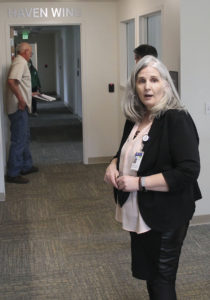
File photo
It took being thrown into detox to get her on the path to sobriety.
“I ended up in treatment on my 26th birthday,” she said. “I pick Feb. 1 as my clean date because I don’t remember the last week of January, but I know that I woke up in detox on Feb. 1, and then I went into treatment on Feb. 8.
“I remember everybody telling me what a gift that was on my 26th birthday, and I thought it was bullshit.”
Though she didn’t realize it at the time, Story was very sick. She was termed a late stage alcoholic and drug addict, but that didn’t make sense to her.
“I weighed about 89 pounds, thought I was drop dead gorgeous, my hair was falling out, my nails were falling off,” she said.
Her plan was to quit meth, but figured she could continue drinking, she said.
So Story enrolled into a “therapeutic community” in Deadwood, Ore., on a ranch that used harsh methods to combat addiction, she said.
“If I did the kind of things in treatment that we did then, I’d get fired. They were old school. They were very confrontational, very harsh, very in-your-face,” she said.
Story – being a combination of a manipulative addict and just Kelley Story, herself – rarely found a person who liked her. It was no different at the ranch. During a feedback session, the nicest thing anyone said to her was that she “had more games going than Mattel Toys.”
“I was a hateful woman in treatment,” she said. “I didn’t like men. I didn’t like women. I was not a pleasant woman to have in treatment. I would kick me out of any program I run. Literally. I would not tolerate any of the behavior I pulled in treatment.”
But they kept her, and she stayed. It took her two months to get through the first phase, which usually only takes a week.
One of the residents – “Old Everclear” they called him – had a talk with Story one day that really impacted her at the ranch.
He said, “I’ve heard people say you have walls and you’re guarded, but that’s not what strikes me about you. What strikes me about you is it’s not the walls, it’s the sniper fire and the dogs and everything else.”
He said, “I don’t know if you’re ever going to change, because it really works for you. All I know is anybody who’s as guarded as you and has all those defenses is protecting something pretty precious.”
And then he left.
Story laughed when she recalled the conversation.
“I was like, ‘wow!’”
But what he said stuck. He was right, she said. She had a lot of things that worked well for her; was she willing to give them up?
Story met her hero at the ranch. It wasn’t Old Everclear. It was Patrick Story, also a recovering addict, and the man she would marry.
“He taught me a lot about getting clean and staying clean, and he taught me
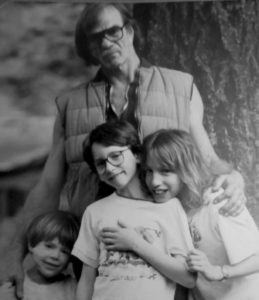
Photo courtesy of Kelley Story
that I had to change my thinking and my lifestyle, my behaviors,” she said.
She was willing to get clean, but she wasn’t willing to stay clean, she said. She understood she had to give up drugs and alcohol, but she didn’t see any reasoning for changing everything else.
But Patrick challenged her. A recovering addict himself, he taught her how to live sober.
“I didn’t know anything. I hadn’t done anything clean and sober for years. I had not gone grocery shopping. I had not checked the mail. I had not done anything without drugs and alcohol in my system,” she said.
Patrick helped her get her previous two children back, and they had a child of their own as well. He also encouraged her to go to school, something she would never have considered, she said.
But he got the FAFSA form and made her fill it out, he sat with her as she took the assessment test, and he made sure the car never broke down, so she could get to school.
“When I got clean, I didn’t know what else I could do. Drugs and alcohol were about all I knew.”
So she chose to study the only thing that made sense: drug and alcohol counseling.
At the same time, she learned a new law would cut her off food stamp benefits after 18 months. That gave her a year and a half to complete a two-year education. Even Patrick, her rock, told her it was impossible, but that inadvertently made him much more her hero because she wanted to prove him wrong.
And she did.
“When I started, that was all I was gonna do. I was gonna do my associates degree and call it good. Then my brain kicked in.”
Story worked for a little bit, then went back to college to get her Bachelor’s. It took four years to get the degree because in the midst of that, she worked full time, raised three kids and took care of Patrick during his triple bipass surgery.
“I just promised myself I was always gonna go back, that I just wasn’t going to give up until I had that degree. That was hard because it took a long time.”
Story earned her Bachelor’s in 2001.
“The day I graduated, my kids were standing at the other end of the stage, and I remember them yelling, ‘That’s my mom!’ And that made it all worthwhile,” she said behind tears.
That was also the year she and Patrick decided to get a divorce and split the kids between them.
Looking back, Story doesn’t know what she was thinking at the time, but she moved across the states to Maine and settled into a job as a case manager. She was her boss’s first hire.
“I ran a women and children’s program, and we took over a halfway house and I designed that program,” she said.
Then she designed a management program for them as a consultant, and later took over as the director to clean up the mess there, she said.
“I am somebody who that’s what I do,” Story said. “I kind of either clean something up, or I start something new.”
At another job she worked, the program began doing medication-assisted treatment.
“I didn’t like it because I was a 12-step person and I was real abstinence-based and I believed that people just needed to get clean,” she said. “I threw fits about it and I stomped my feet.”
So her boss put her in charge. That forced her to question her own beliefs, and she had to figure out why she didn’t like the program.
“What I didn’t like about it is people weren’t changing. So we stepped in and we figured out how to run a program solidly and to make it recovery-oriented, and that’s what we did.”
Meanwhile, she visited Patrick and her kids in Oregon from time to time, and noticed her ex was relapsing.
“It kind of rocked my world,” she said.
Her mother also started using again. She’d only stayed clean for a year.
“My mother was a piece of work, and she was well-known in the systems I worked in. It was often that I got calls about her. She could create havoc quite regularly.”
And then it was her kids.
“So I was kinda getting surrounded by addiction,” she said.
It was an ugly time, Story said. Patrick was using, he was dying of cancer, her kids were mad at her, and her mom eventually died from an overdose. Coupled with working and returning to school for her Master’s, Story was making herself sick.
It was so bad, that she put herself in the hospital because she thought she was having a heart attack, she said. The doctors told her she needed to change her lifestyle. She resisted at first, but soon did a 180 and moved back to Oregon.
“What I learned is other peoples’ addiction can kill me too,” Story said. “I got just as physically and mentally ill as I did behind my own. So I have to take really good care of myself around that kind of stuff.”
And that’s advice she would give to anyone who knows someone with an addiction: take care of yourself first.
Story was working at Community Outreach, Inc., in Corvallis when she heard about the position for the new STARS inpatient program in Lebanon. After some prodding from a few close people in her life, she applied for the job.
As soon as she met Marty Cahill, CEO at Samaritan Lebanon Community Hospital, she knew it would be a good fit, she said. After all, they’re both from Massachusetts.
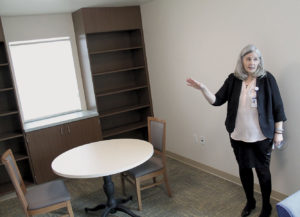
But she came in with a few bruises. During the past years in other jobs, she had lost confidence and lost her footing a little bit, she said.
“Marty’s one of the best bosses I’ve ever had, and I’m not just saying that. Working here and working for Marty has put me back on my feet. I will never, ever forget that, no matter what.”
Though she believed the original building, which Samaritan had purchased from Teen Challenge, at Main and Tangent streets, was workable, having a brand new building boosted her confidence even more.
“I believe that everything you do in a treatment center tells clients how you feel about them. I think this building and this program tells our patients and their families a hell of a lot about how we feel about them. I am incredibly grateful,” she said behind tears.
At the outpatient and inpatient services at STARS, Story’s intention is to be relational.
She knows all the theoretical, cognitive and behavioral approaches to therapy, but for Story, it begins with being genuine and authentic, and building a relationship.
“What I know is we (addicts) are often very difficult to deal with, we’re unpleasant, so who wants to sit there and deal with us? But for that moment, right there, you’ve got my attention.”
She believes anything can be done if a relationship is built. She also believes the disease of addiction kills people, she said.
“When I run groups and stuff, we have a lot of fun. We joke around and have a lot of fun, and I use a lot of humor, but there’s also times when it’s like, ‘OK, this is deadly.’”


